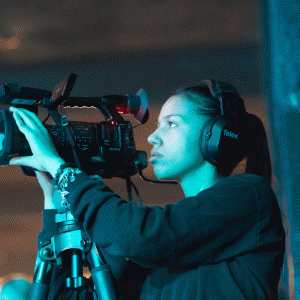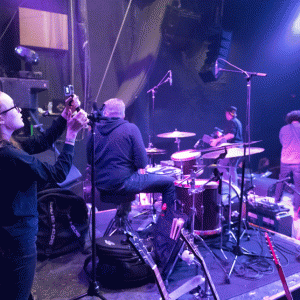excerpted from original Source article
As the musicians onstage at an Aggie Theater show rocked the crowd in Fort Collins, CSU students captured more than three hours of performances on video for a national audience. As some students scrambled to record the musicians and clamoring crowd from various angles, other students raced to exchange fresh batteries and recharge the used ones. They shuttled full media cards from cameras to computers for data transfer, and dodged concert-goers to exchange memory cards with the students running the cameras.
The recent concert video shoot at the Aggie included about 10 videographers from Colorado State University, most of them students, along with a handful of professional video and audio producers. Late in the evening, over the pulsing sound of guitars and drums, one student — still fresh in the excitement of this kind of unconventional classwork — looked up from her camera smiling. “I just got a perfect shot,” she said.
The scene is part of a valuable experience for a group of students who are getting hands-on experience with the skills and equipment they’ll use in the world of professional video production and broadcasting.
The group is called Ram Productions, and as part of the music, stage and sports production minor in the Department of Journalism and Media Communication, they shoot and edit video footage of everything from theatre and dance performances to sporting events and concerts.
‘Never looked back’
“I started in Ram Productions my sophomore year, and I’d never touched a professional video camera before,” says Megan Rakoczy, who graduated in 2016 with a degree in journalism and a minor in music, stage and sports production. “I gave it a go and never looked back.”
Among the pieces of cutting-edge video equipment she mastered was the TriCaster, a portable professional video production tool used to simultaneously switch among cameras, graphics, and special effects while incorporating audio mixing, recording, social media publishing, and web streaming.
“It’s a significant piece of equipment that not a lot of people get experience with,” Rakoczy says. “After graduation, I got a job with Weather Nation just because I knew how to turn it on and work it during the show.”
“That’s what they’re likely to use if they do this as a career,” says CSU special projects coordinator and instructor Steve Weiss (‘78), the communications studies alumnus and veteran video producer who now shepherds Ram Productions. “We try to expose them to equipment they’ll use in the real world.”

Collaboration with professionals
The recent music shoot at the Aggie Theatre is part of a collaboration among CSU, The Music District, and Front Range radio station 105.5 FM The Colorado Sound to support the station’s new affiliation with VuHaus, a national collective of the most influential public media stations rooted in local music. It recently launched a Colorado page on its website as part of the Colorado Music Strategy, a collaborative among The Colorado Sound and five other public radio stations around the state, including KRFC in Fort Collins.
The March 9 performances featured Dragondeer, Rob Drabkin, Brent Cowles and Paper Bird. The students in Ram Productions captured much of the video, alongside professional CSU videographers Brian Buss and Jason Russell.
“Anytime we can work alongside the professionals, that just raises our bar,” Weiss says. “They’re teaching our students while working with them.”
In addition, Ram Productions also shot the CSU performance of The Resistible Rise of Arturo Ui in March at the University Center for the Arts (including a rehearsal as a warm-up to get acquainted with the production). Some of the students who worked on that video project are theatre majors, including senior Logan Smith, who directed it.
“We’re learning exactly what people use in the real world,” says Smith, who also directed the Slow Caves shoot.
Only about a third of the Ram Productions team are journalism majors — another third are communication studies majors, and the rest come from various disciplines like music, sociology, psychology, English, interior design, even natural resources tourism. Many of them, like Rakoczy, have little or no live video production experience when they start.
“It’s kind of trial by fire and learn as you go,” Weiss says. “After a shoot we break it down and analyze what worked and what didn’t. It’s like a laboratory.”
Three semesters of participation in the one-credit practicum are required for all students earning the music, stage and sports production minor. For non-journalism majors, Weiss says, the minor is a gateway to popular but exclusive classes like field production and video editing.
In addition to theatre and music productions, the students in Ram Productions also work with the CSU athletics department on everything from the live game action and replays shown on the video boards during football, basketball and volleyball games to Mountain West online streaming coverage of soccer and softball games. Last year, athletics provided Ram Productions with more than 200 crew positions and over 900 production hours.

Distribution
The team has 185 videos on its own “CSUliveProductions” YouTube channel, which has more than 156,000 views and nearly 300 subscribers. Its recorded programs are also aired on the campus television station, CTV Channel 11.
After working for Weather Nation in Centennial, alumna Rakoczy started her own video production company called WideEyed Productions and now freelances for college sporting events around Colorado. Growing up, she always wanted to go to film school and end up in Hollywood, but now she’s glad that Ram Productions helped give her a career.
“I’m not sure what path I would have taken without it,” she says of the experience. “Ram Productions gave me a glimpse of a different side of the production world.”
“I want them to walk out the door saying, ‘I found what I want to do for my career,’” Weiss says.
Learn more about the Department of Journalism and Media Communication.
Like the Department of Journalism and Media Communication on Facebook.
